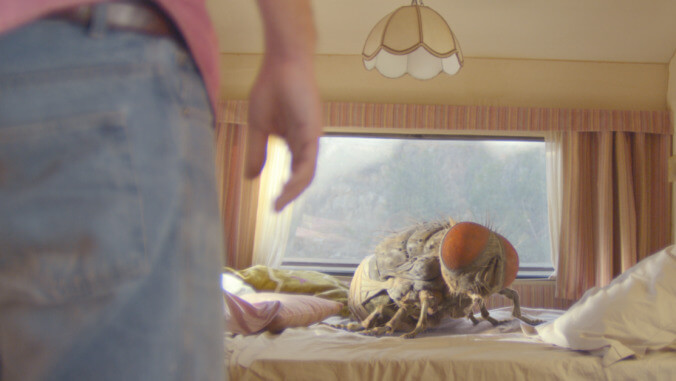Be amused, be very amused by the dog-sized housefly of Mandibles
The latest oddity from French filmmaker Quentin Dupieux generates frustratingly arbitrary laughs

For French filmmaker Quentin Dupieux, no premise is so outlandish that it can’t be rendered oddly mundane. A murderous automobile tire? A dude who’s homicidally obsessed with his new deerskin jacket? Two boneheads who discover a enormous housefly and decide they should train it to rob banks? As goofy as those ideas are, each is merely the starting point for free-floating absurdity, as Dupieux simply follows his deranged muse in whatever random direction it happens to wander. The results can be frustratingly slight and maddeningly amorphous, but it’s bracing to have absolutely no clue where a movie is headed.
Mandibles, as its title suggests, is the giant-fly movie, Dupieux’s latest. True to form, he kicks things off with what appears to be a conventional narrative hook, though it’s almost immediately abandoned. Sleeping on the beach, homeless doofus Manu (Grégoire Ludig, who previously starred in Dupieux’s Keep An Eye Out) is awakened by an acquaintance and improbably handed a task that will earn him €500: He’s to find a car, drive to a particular location, pick up a briefcase, not open the briefcase (or ask what’s inside), and then deliver it to another location. A basic thriller setup that’s been utilized numerous times. Manu, however, steals a beat-up Mercedes that he and best friend Jean-Gab (David Marsais) soon discover contains, nestled in its trunk, a fly roughly the size of a bulldog. Jean-Gab quickly persuades Manu to forget about the briefcase and instead focus on turning the fly, which they name Dominique, into a living drone of sorts, insisting that they can make considerably more than €500 by training it to commit crimes. That this inane logic is never even briefly questioned constitutes part of Mandibles’ screwball charm.
Another part, along with some potential disappointment, derives from the fact that Dupieux never really quite gets around to the bank-robbing fly storyline, either. Much of the film’s first half consists of Manu and Jean-Gab’s efforts to find a suitable training ground for Dominique—they wind up commandeering somebody’s camper, then accidentally burning it down—and figuring out how to feed both the fly and themselves without yet having acquired any funds. Ludig and Marsais give the protagonists an endearingly witless dynamic that makes them come across as a Gallic middle-aged Bill and Ted; one running joke, which gets funnier as the film goes along, has them constantly forming bull horns with their hands (thumb clasping the two middle fingers) and pressing them together while jointly exclaiming “Toro!” This bromance eventually gets offset by the appearance of three women, one of whom (played by Staying Vertical’s India Hair) sees Manu on the road and mistakes him for an old high-school sweetheart. The film’s second half thus becomes a bizarre farce in which our heroes attempt to hide Dominique while they’re guests at the summer house where the women (and one annoying brother) are currently vacationing.
A great deal of work clearly went into the giant animatronic fly, which is suitably disgusting to behold and performs realistically fly-like movements, yet eventually registers as an almost cuddly pet. It’s typical of Dupieux’s work, though, that Dominique—ostensibly Mandibles’ focus—winds up thoroughly upstaged by Agnès (Adèle Exarchopoulos), the strangest of Manu and Jean-Gab’s new companions. For a while, Agnès doesn’t say anything, silently observing as her friends chat and flirt; when she finally does start talking, it’s revealed that she sustained a head injury while skiing some time ago, causing her to speak even the most banal sentences at the precise level of volume and intensity that you’d employ to call people’s attention to an incoming, potentially civilization-ending meteor. Having previously appeared almost exclusively in serious dramas (most notably Blue Is The Warmest Color), Exarchopoulos takes full advantage of this opportunity to go over the top, creating an indelibly wacky character that at once reinforces and merrily trashes her volatile image. It’s a performance as hilarious as it is arbitrary—one that would likely work just as well, and seem no more or less out of place, in any other Dupieux film. If you seek something that coalesces in a satisfying way, this ain’t the auteur for you. If you long to be caught off guard, take a seat.